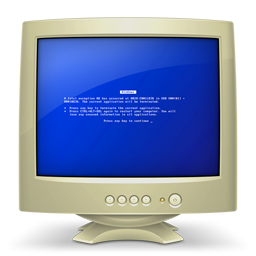The End of the PC Era
November 29, 2010 As with most paradigm shifts in technology, it's usually pretty hard to tell what the landscape will look like in five years. There's always a small few who predict major shifts in technology and for the most part they're either wrong, inaccurate or at the very least, told they're nuts.
As with most paradigm shifts in technology, it's usually pretty hard to tell what the landscape will look like in five years. There's always a small few who predict major shifts in technology and for the most part they're either wrong, inaccurate or at the very least, told they're nuts.
I'm willing to be told I'm nuts because my collective experiences, my knowledge and my understanding of technology are telling me something. They're telling me the PC is dead.
I don't say that lightly. And it's not a statement motivated by some desire to see Microsoft falter because of my support of Apple. In fact, when I say PC - I mean personal computer, which includes Macs and other machines that run Linux and UNIX operating systems.
Remember when only a few years ago, most believed General Motors was a company incapable of failure? A symbol of American industrial might and blind loyalty of many American consumers wasn't enough to sustain GM's troubles. GM is one of many companies that, throughout history, have achieved a monopolistic hold on a market, only to falter and eventually fail. Here's what I say: The PC as we know it, has three years to live and Microsoft is the next General Motors.
Why do I say that? Because as we speak, millions of tablets, most of them iPad, are flying off the shelves. What does that directly translate to? Fewer and fewer sales of PCs. In fact, research firm Gartner has announced it's reducing its world-wide PC shipment projections for 2010 and 2011. They specifically cite the iPad as the reason why. It's starting to become clear to industry experts that iPad is taking significant market share from traditional PC sales.
The key reason why I say the PC era is coming to an end is the way that PC manufacturers have built their business models. Companies like Dell, HP, Lenovo and Toshiba (to name a few) have decided for years that the best way to increase sales of PCs is to drive costs down and sell cheaper hardware. The problem with that strategy is that it's effectively run out of rope. The price of entry-level PCs have become so low there's no profit generated from selling. What's worse is that while low cost PCs fail to generate profit for their manufacturers, products like iPad are generating huge profit in the same price category.
A second key aspect of why the PC era is ending is the reason why people are gravitating to iPads in the first place. Without going on about how great the iPad is, and I do think it's wonderful, here's a few elements of why: 1) The iPad's touch interface makes it easy for people with little computer literacy to master the device. 2) There's no complex file system and no real complexity of any kind. The iPad functions like an appliance. 3) iPad requires little to no tech support. 4) Users can pick from a catalog of over 300,000 apps and never worry about software glitches or viruses as a consequence. 5) iPad is truly portable because not only is it lightweight, it's battery lasts more than an entire workday which means you don't need to carry a power cord. Last but not least, the expectations of the average user are higher than they were five or even ten years ago. That's because generations now buying technology have grown up with it. People are expecting their computers to work like appliances and that's what makes mobile devices like iPad a big hit - they're appliances and not computers.
Understanding that fewer PCs are being sold and that even fewer will be sold from here on in is important. From there, it's important to understand that as this happens, we will reach an inflection point. That inflection point will arrive when, due to lower and lower sales, the average cost of the PC begins to rise due to lower volumes. That might be a good thing for manufacturers selling PCs in the bargain basement, but it's only a temporary side effect - the train has left the station and it's not coming back.
Reality is that mobile devices like iPad will continue to gain more and more features. In the near future, we will see iPads powering large screens and televisions. Even now, you can stream video wirelessly from your iPad or iPhone if you've got a new Apple TV set-top box. It's the beginning of what's coming. Mobile devices are becoming more powerful. Soon, they're going to be powerful enough to start facilitating content creation, rather than being confined to content consumption like they are now. As this happens, we're going to be left with three classes of users. One, a very small portion of the mass PC market, is those who use their computers for heavy lifting. Video, audio, CAD, scientific simulation, software development and 3D rendering will continue to require more horsepower than we'll be able to fit in a mobile device. The second class is those who use PCs as servers, but that category is dwindling too as businesses and consumers alike migrate to 'the cloud.' The third class, and by far the biggest, is those who use their computers to consume and communicate.
As these three classes of computer users emerge, only a small few will actually require what we now think of as a PC. That means, because of low volumes, prices will rise as economies of scale become completely focused on mobile devices.
If you follow the mobile industry, you're aware that right now, Microsoft has no presence to speak of. There's no mobile Office for iPad or iPhone. Windows Phone 7 is three years late to the party and lacks many features we've taken for granted. Microsoft does not have an app store of any consequence while Apple's boasts close to 10 billion downloads. It seams that Microsoft can't get a meaningful mobile product out the door and that's very bad. If Microsoft doesn't produce a successful mobile product capable of taking significant market share, its future is bleak. That's because the only profit Microsoft generates, comes from Office and Windows - products confined to the PC.
It doesn't matter to me for the purposes of this argument whether iPad will continue to dominate the tablet landscape. What's important is that PC sales are declining and that big wheels are beginning to roll downhill. The mobile revolution is happening as we speak and it's going to completely change computing for the masses. And because of the factors I outlined above, adoption of mobile devices is accelerating and will continue to do so.
Here's how you'll know we've reached the inflection point I'm speaking of. First, when the average price of a PC begins to compare to the entry level pricing of a Mac and; Second, when Microsoft starts reporting a succession of quarters where volume and then revenue fall. From there, it won't take long for a massive bureaucracy like Microsoft to crack under its own weight.
A few years ago, I wouldn't be caught telling people Microsoft and the PC were doomed. Now, it seems like a foregone conclusion unless something profound saves them from the loss of their monopoly. Either way, the era of the PC is coming to an end.
Other posts by Chris Marriott
- Seeking Backstage Resellers
- Preemptive Multi-Talking -- Johnny and the Liquidators
- Preemptive Multi-Talking -- Pundits are the worst!
- Preemptive Multi-Talking -- WWDC 2016
- Preemptive Multi-Talking -- Of Cash Piles and Job Cuts
- Preemptive Multi-Talking -- 60 Scary Minutes Edition
- Preemptive Multi-Talking -- [R]Evolution Edition
- Preemptive Multi-Talking -- Pinocchio Edition
- Preemptive Multi-Talking -- FBI vs. Apple
- Preemptive Multi-Talking -- 1984 Edition
- Preemptive Multi-Talking -- Earnings Madness Edition
- Preemptive Multi-Talking -- All your passwords are belong to us.
- Preemptive Multi-Talking -- Fog, Fizzle, Flop Edition
- Preemptive Multi-Talking -- FUD Redux Edition
- Preemptive Multi-Talking -- Privacy be Damned Edition
